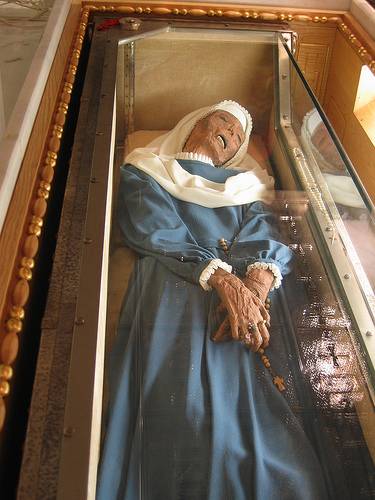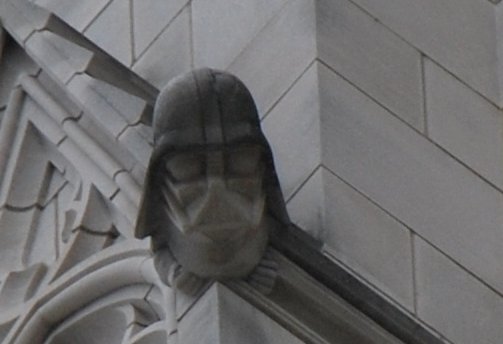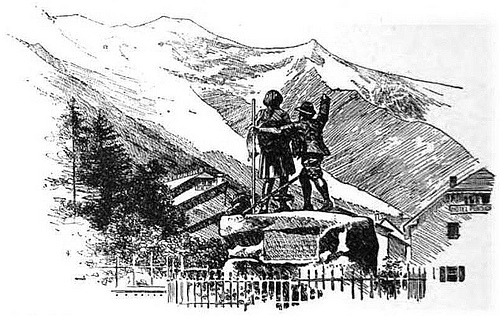
Virginia Centurione Bracelli died in 1651, but her body was found largely uncorrupted when her grave was opened 150 years later.
She was canonized in 2003.

Virginia Centurione Bracelli died in 1651, but her body was found largely uncorrupted when her grave was opened 150 years later.
She was canonized in 2003.
Whilst sitting quietly in [Bank House], the inmates have been frequently alarmed — sometimes two or three times a day — by the descent of showers of water, apparently from the ceiling. These showers have drenched them, flooding the floor and covering the furniture with water, rendering the house almost uninhabitable. … The water comes straight down from the ceiling, and shows not the slightest indication of its being thrown into the apartment. So singular is the affair that people have concluded that it is some spiritual influence, and is a sort of judgment upon the good ladies of the house for some dereliction, who, naturally enough, are much affrighted.
— Preston Herald, Feb. 15, 1873
“When young Sten was bar-mitzvahed, Sten Sr. took him on safari, as a present, during the course of which Mrs. Sten received this jubilant telegram”:
YOUNG STEN NETS GNU! OY!
— John McClellan

Each term in the Fibonacci sequence is derived by adding the two preceding terms:
0, 1, 1, 2, 3, 5, 8, 13, 21 …
Remarkably, you can use successive terms to convert miles to kilometers:
8 miles ≈ 13 kilometers
13 miles ≈ 21 kilometers
This works because the two units stand in the golden ratio (to within 0.5 percent).
George Selwyn once declared in company that a lady could not write a letter without adding a postscript. A lady present replied, ‘The next letter that you receive from me, Mr. Selwyn, will prove that you are wrong.’ Accordingly he received one from her the next day, in which, after her signature was the following:–
‘P.S. Who is right, now, you or I?’
— Charles Carroll Bombaugh, Gleanings for the Curious from the Harvest-Fields of Literature, 1890

There’s a sculpture of Darth Vader on Washington’s National Cathedral.
During construction, a competition was held among children to suggest a carved grotesque, and Christopher Rader of Kearney, Neb., submitted a drawing of Darth Vader’s head.
It’s visible on the cathedral’s northwest tower — but you’ll need binoculars to see it.
Here’s a poser adapted from a 1923 intelligence test:
“I was so sorry to hear of Harold’s death, Mary.”
“Thank you, Mildred.”
“May I ask the circumstances?”
“Of course. He had fallen asleep in church during the sermon and was dreaming that an executioner was approaching to cut off his head. He had witnessed some rather gruesome things during the Boxer Rebellion in China some years ago, you know. Just as the sword was falling, I happened to touch him on the back of his neck with my fan, to awaken him. The shock was too great, and he fell forward dead.”
What’s wrong with this story?
(3 + 4)3 = 343

In August 1820, an avalanche swept three mountaineers into a crevasse on Mont Blanc. Thirty-eight years later, a physicist who had studied the glacier’s rate of flow predicted that the bodies would soon be given up. He was right. William Herbert Hobbs writes in Earth Features and Their Meaning:
In the year 1861, or forty-one years after the disaster, the heads of the three guides, separated from their bodies, with some hands and fragments of clothing, appeared at the foot of the Glacier des Bossons, and in such a state of preservation that they were easily recognized by a guide who had known them in life.
The bodies had traveled 3,000 meters in 41 years. “To-day,” wrote Hobbs in 1912, “the time of reappearance of portions of the bodies of persons lost upon Mont Blanc is rather accurately predicted, so that friends repair to Chamonix to await the giving up of its victims by the Glacier des Bossons.”
Near the village of Combe-Hay, in England, there was a wood composed largely of oaks and nut trees. In the middle of it was a field, about fifty yards long, in which six sheep were struck dead by lightning. When skinned there was discovered on them, on the inside of the skin, a facsimile of part of the adjacent landscape.
— William Walsh, A Handy Book of Curious Information, 1913